Deborah J. Ross's Blog, page 71
February 20, 2019
Today's Moment of Art
Published on February 20, 2019 01:00
February 19, 2019
On Not Finishing Stories...
A few years ago, I wrote a blog post, Contrary Writing Advice: Don't Finish That Story!
It appeared here and on the SFWA website. They just re-posted it
It begins:
Guest Post: Contrary Writing Advice: Don’t Finish This Story!by Deborah J. Ross I love to take conventional wisdom and turn it on its head, following the tradition of rules are made to be broken but first you have to learn them. Beginning writers make mistakes. At least, I did, and I don’t know anyone who’s gone on to a successful writing career who didn’t. At some point, either a teacher or a more skillful writer points out, “Don’t do this” and why it’s a bad idea. Sometimes we figure it out for ourselves. I wonder if in the process of expunging our mistakes we also ignore that kernel of wisdom or inner creative impulse that led us to make the mistake in the first place.For example, we get told, “Avoid passive verbs, especially the verb to be.” But sometimes that is exactly the right verb and if we contort our prose to avoid it at all costs, we end up with…well, contorted prose.The writing rule to Always Finish What You Start is equally worthy of a challenge, yet it rarely is. The rule is practically engraved in granite, creating a sense of obligation to slog through stories, no matter how much we’ve grown beyond them. We end up with trunk stories (stories that are so flawed as to be unsellable and are therefore relegated to the proverbial storage chest) when we could have been writing the very best new stories we’re now capable of. The second rule, to move on to something new, is a good one most of the time, as is the commiseration, Not every story succeeds. I’m all for taking risks in our writing with the understanding that we’ll occasionally go splat into the Quagmire of Drekness from time to time.Is there any value to starting things we don’t finish? (Or allowing ourselves to not finish what we start?) That is, aside from dropping projects that just aren’t working and using our time and creative energy more productively? I think there is.Beginning writers often have far more ideas than they can put into stories. We’re like kids in a candy store, with our minds hopping with images, bits of dialog, ultimately cool mcguffins, nifty plot twists, you name it. When we’re new, we don’t have the experience to sort out what’s prime story core material, what needs development, what needs a lot of development and a lot of structure before it stands a hope of becoming a story. So as beginners we dive into whatever strikes our fancy and end up with files and files of story beginnings. That’s a valuable part of the learning process, even if it is far from comprehensive. Later, when we know how to cultivate those ideas into stories that work, we can return to those sketches and openings as a treasure trove of ideas. our mistakes we also ignore that kernel of wisdom or inner creative impulse that led us to make the mistake in the first place.For example, we get told, “Avoid passive verbs, especially the verb to be.” But sometimes that is exactly the right verb and if we contort our prose to avoid it at all costs, we end up with…well, contorted prose.The writing rule to Always Finish What You Start is equally worthy of a challenge, yet it rarely is. The rule is practically engraved in granite, creating a sense of obligation to slog through stories, no matter how much we’ve grown beyond them. We end up with trunk stories (stories that are so flawed as to be unsellable and are therefore relegated to the proverbial storage chest) when we could have been writing the very best new stories we’re now capable of. The second rule, to move on to something new, is a good one most of the time, as is the commiseration, Not every story succeeds. I’m all for taking risks in our writing with the understanding that we’ll occasionally go splat into the Quagmire of Drekness from time to time.Is there any value to starting things we don’t finish? (Or allowing ourselves to not finish what we start?) That is, aside from dropping projects that just aren’t working and using our time and creative energy more productively? I think there is.Beginning writers often have far more ideas than they can put into stories. We’re like kids in a candy store, with our minds hopping with images, bits of dialog, ultimately cool mcguffins, nifty plot twists, you name it. When we’re new, we don’t have the experience to sort out what’s prime story core material, what needs development, what needs a lot of development and a lot of structure before it stands a hope of becoming a story. So as beginners we dive into whatever strikes our fancy and end up with files and files of story beginnings. That’s a valuable part of the learning process, even if it is far from comprehensive. Later, when we know how to cultivate those ideas into stories that work, we can return to those sketches and openings as a treasure trove of ideas.
I love to take conventional wisdom and turn it on its head, following the tradition of rules are made to be broken but first you have to learn them. Beginning writers make mistakes. At least, I did, and I don’t know anyone who’s gone on to a successful writing career who didn’t. At some point, either a teacher or a more skillful writer points out, “Don’t do this” and why it’s a bad idea. Sometimes we figure it out for ourselves. I wonder if in the process of expunging our mistakes we also ignore that kernel of wisdom or inner creative impulse that led us to make the mistake in the first place.For example, we get told, “Avoid passive verbs, especially the verb to be.” But sometimes that is exactly the right verb and if we contort our prose to avoid it at all costs, we end up with…well, contorted prose.The writing rule to Always Finish What You Start is equally worthy of a challenge, yet it rarely is. The rule is practically engraved in granite, creating a sense of obligation to slog through stories, no matter how much we’ve grown beyond them. We end up with trunk stories (stories that are so flawed as to be unsellable and are therefore relegated to the proverbial storage chest) when we could have been writing the very best new stories we’re now capable of. The second rule, to move on to something new, is a good one most of the time, as is the commiseration, Not every story succeeds. I’m all for taking risks in our writing with the understanding that we’ll occasionally go splat into the Quagmire of Drekness from time to time.Is there any value to starting things we don’t finish? (Or allowing ourselves to not finish what we start?) That is, aside from dropping projects that just aren’t working and using our time and creative energy more productively? I think there is.Beginning writers often have far more ideas than they can put into stories. We’re like kids in a candy store, with our minds hopping with images, bits of dialog, ultimately cool mcguffins, nifty plot twists, you name it. When we’re new, we don’t have the experience to sort out what’s prime story core material, what needs development, what needs a lot of development and a lot of structure before it stands a hope of becoming a story. So as beginners we dive into whatever strikes our fancy and end up with files and files of story beginnings. That’s a valuable part of the learning process, even if it is far from comprehensive. Later, when we know how to cultivate those ideas into stories that work, we can return to those sketches and openings as a treasure trove of ideas. our mistakes we also ignore that kernel of wisdom or inner creative impulse that led us to make the mistake in the first place.For example, we get told, “Avoid passive verbs, especially the verb to be.” But sometimes that is exactly the right verb and if we contort our prose to avoid it at all costs, we end up with…well, contorted prose.The writing rule to Always Finish What You Start is equally worthy of a challenge, yet it rarely is. The rule is practically engraved in granite, creating a sense of obligation to slog through stories, no matter how much we’ve grown beyond them. We end up with trunk stories (stories that are so flawed as to be unsellable and are therefore relegated to the proverbial storage chest) when we could have been writing the very best new stories we’re now capable of. The second rule, to move on to something new, is a good one most of the time, as is the commiseration, Not every story succeeds. I’m all for taking risks in our writing with the understanding that we’ll occasionally go splat into the Quagmire of Drekness from time to time.Is there any value to starting things we don’t finish? (Or allowing ourselves to not finish what we start?) That is, aside from dropping projects that just aren’t working and using our time and creative energy more productively? I think there is.Beginning writers often have far more ideas than they can put into stories. We’re like kids in a candy store, with our minds hopping with images, bits of dialog, ultimately cool mcguffins, nifty plot twists, you name it. When we’re new, we don’t have the experience to sort out what’s prime story core material, what needs development, what needs a lot of development and a lot of structure before it stands a hope of becoming a story. So as beginners we dive into whatever strikes our fancy and end up with files and files of story beginnings. That’s a valuable part of the learning process, even if it is far from comprehensive. Later, when we know how to cultivate those ideas into stories that work, we can return to those sketches and openings as a treasure trove of ideas.
You can read the rest of it on sfwa.org or here.
It appeared here and on the SFWA website. They just re-posted it
It begins:
Guest Post: Contrary Writing Advice: Don’t Finish This Story!by Deborah J. Ross
 I love to take conventional wisdom and turn it on its head, following the tradition of rules are made to be broken but first you have to learn them. Beginning writers make mistakes. At least, I did, and I don’t know anyone who’s gone on to a successful writing career who didn’t. At some point, either a teacher or a more skillful writer points out, “Don’t do this” and why it’s a bad idea. Sometimes we figure it out for ourselves. I wonder if in the process of expunging our mistakes we also ignore that kernel of wisdom or inner creative impulse that led us to make the mistake in the first place.For example, we get told, “Avoid passive verbs, especially the verb to be.” But sometimes that is exactly the right verb and if we contort our prose to avoid it at all costs, we end up with…well, contorted prose.The writing rule to Always Finish What You Start is equally worthy of a challenge, yet it rarely is. The rule is practically engraved in granite, creating a sense of obligation to slog through stories, no matter how much we’ve grown beyond them. We end up with trunk stories (stories that are so flawed as to be unsellable and are therefore relegated to the proverbial storage chest) when we could have been writing the very best new stories we’re now capable of. The second rule, to move on to something new, is a good one most of the time, as is the commiseration, Not every story succeeds. I’m all for taking risks in our writing with the understanding that we’ll occasionally go splat into the Quagmire of Drekness from time to time.Is there any value to starting things we don’t finish? (Or allowing ourselves to not finish what we start?) That is, aside from dropping projects that just aren’t working and using our time and creative energy more productively? I think there is.Beginning writers often have far more ideas than they can put into stories. We’re like kids in a candy store, with our minds hopping with images, bits of dialog, ultimately cool mcguffins, nifty plot twists, you name it. When we’re new, we don’t have the experience to sort out what’s prime story core material, what needs development, what needs a lot of development and a lot of structure before it stands a hope of becoming a story. So as beginners we dive into whatever strikes our fancy and end up with files and files of story beginnings. That’s a valuable part of the learning process, even if it is far from comprehensive. Later, when we know how to cultivate those ideas into stories that work, we can return to those sketches and openings as a treasure trove of ideas. our mistakes we also ignore that kernel of wisdom or inner creative impulse that led us to make the mistake in the first place.For example, we get told, “Avoid passive verbs, especially the verb to be.” But sometimes that is exactly the right verb and if we contort our prose to avoid it at all costs, we end up with…well, contorted prose.The writing rule to Always Finish What You Start is equally worthy of a challenge, yet it rarely is. The rule is practically engraved in granite, creating a sense of obligation to slog through stories, no matter how much we’ve grown beyond them. We end up with trunk stories (stories that are so flawed as to be unsellable and are therefore relegated to the proverbial storage chest) when we could have been writing the very best new stories we’re now capable of. The second rule, to move on to something new, is a good one most of the time, as is the commiseration, Not every story succeeds. I’m all for taking risks in our writing with the understanding that we’ll occasionally go splat into the Quagmire of Drekness from time to time.Is there any value to starting things we don’t finish? (Or allowing ourselves to not finish what we start?) That is, aside from dropping projects that just aren’t working and using our time and creative energy more productively? I think there is.Beginning writers often have far more ideas than they can put into stories. We’re like kids in a candy store, with our minds hopping with images, bits of dialog, ultimately cool mcguffins, nifty plot twists, you name it. When we’re new, we don’t have the experience to sort out what’s prime story core material, what needs development, what needs a lot of development and a lot of structure before it stands a hope of becoming a story. So as beginners we dive into whatever strikes our fancy and end up with files and files of story beginnings. That’s a valuable part of the learning process, even if it is far from comprehensive. Later, when we know how to cultivate those ideas into stories that work, we can return to those sketches and openings as a treasure trove of ideas.
I love to take conventional wisdom and turn it on its head, following the tradition of rules are made to be broken but first you have to learn them. Beginning writers make mistakes. At least, I did, and I don’t know anyone who’s gone on to a successful writing career who didn’t. At some point, either a teacher or a more skillful writer points out, “Don’t do this” and why it’s a bad idea. Sometimes we figure it out for ourselves. I wonder if in the process of expunging our mistakes we also ignore that kernel of wisdom or inner creative impulse that led us to make the mistake in the first place.For example, we get told, “Avoid passive verbs, especially the verb to be.” But sometimes that is exactly the right verb and if we contort our prose to avoid it at all costs, we end up with…well, contorted prose.The writing rule to Always Finish What You Start is equally worthy of a challenge, yet it rarely is. The rule is practically engraved in granite, creating a sense of obligation to slog through stories, no matter how much we’ve grown beyond them. We end up with trunk stories (stories that are so flawed as to be unsellable and are therefore relegated to the proverbial storage chest) when we could have been writing the very best new stories we’re now capable of. The second rule, to move on to something new, is a good one most of the time, as is the commiseration, Not every story succeeds. I’m all for taking risks in our writing with the understanding that we’ll occasionally go splat into the Quagmire of Drekness from time to time.Is there any value to starting things we don’t finish? (Or allowing ourselves to not finish what we start?) That is, aside from dropping projects that just aren’t working and using our time and creative energy more productively? I think there is.Beginning writers often have far more ideas than they can put into stories. We’re like kids in a candy store, with our minds hopping with images, bits of dialog, ultimately cool mcguffins, nifty plot twists, you name it. When we’re new, we don’t have the experience to sort out what’s prime story core material, what needs development, what needs a lot of development and a lot of structure before it stands a hope of becoming a story. So as beginners we dive into whatever strikes our fancy and end up with files and files of story beginnings. That’s a valuable part of the learning process, even if it is far from comprehensive. Later, when we know how to cultivate those ideas into stories that work, we can return to those sketches and openings as a treasure trove of ideas. our mistakes we also ignore that kernel of wisdom or inner creative impulse that led us to make the mistake in the first place.For example, we get told, “Avoid passive verbs, especially the verb to be.” But sometimes that is exactly the right verb and if we contort our prose to avoid it at all costs, we end up with…well, contorted prose.The writing rule to Always Finish What You Start is equally worthy of a challenge, yet it rarely is. The rule is practically engraved in granite, creating a sense of obligation to slog through stories, no matter how much we’ve grown beyond them. We end up with trunk stories (stories that are so flawed as to be unsellable and are therefore relegated to the proverbial storage chest) when we could have been writing the very best new stories we’re now capable of. The second rule, to move on to something new, is a good one most of the time, as is the commiseration, Not every story succeeds. I’m all for taking risks in our writing with the understanding that we’ll occasionally go splat into the Quagmire of Drekness from time to time.Is there any value to starting things we don’t finish? (Or allowing ourselves to not finish what we start?) That is, aside from dropping projects that just aren’t working and using our time and creative energy more productively? I think there is.Beginning writers often have far more ideas than they can put into stories. We’re like kids in a candy store, with our minds hopping with images, bits of dialog, ultimately cool mcguffins, nifty plot twists, you name it. When we’re new, we don’t have the experience to sort out what’s prime story core material, what needs development, what needs a lot of development and a lot of structure before it stands a hope of becoming a story. So as beginners we dive into whatever strikes our fancy and end up with files and files of story beginnings. That’s a valuable part of the learning process, even if it is far from comprehensive. Later, when we know how to cultivate those ideas into stories that work, we can return to those sketches and openings as a treasure trove of ideas.You can read the rest of it on sfwa.org or here.

Published on February 19, 2019 01:00
February 18, 2019
Lace and Blade 5 Author Interview: Robin Wayne Bailey
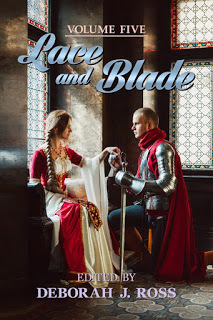 From lands distant or nearby, familiar or utterly strange, historical or imaginary, from ancient times to the Belle Époque comes a treasury of luscious, elegant, romantic fantasy. Come with us on a journey through time and across boundaries, inspired by the longings of the heart and the courage residing in even the meekest person.
From lands distant or nearby, familiar or utterly strange, historical or imaginary, from ancient times to the Belle Époque comes a treasury of luscious, elegant, romantic fantasy. Come with us on a journey through time and across boundaries, inspired by the longings of the heart and the courage residing in even the meekest person.The release date is Valentine's Day 2019, but you can pre-order it now:
Kindle: https://amzn.to/2PBzyj6
ePub: https://www.books2read.com/u/bwYJwP
I crossed paths with Robin Wayne Bailey at various times in my early career, both as contributors to the very first Sword and Sorceress anthology, through GEnie, and later when he was outgoing SFWA President and I was incoming Secretary. I'm pleased to consider him a friend as well as a colleague.
Deborah J. Ross: Tell us a little about yourself. How did you come to be a writer?Robin Wayne Bailey: Besides writing, I have a lot of unrelated passions, including body-building, martial arts, yoga and hiking. Perhaps I shouldn’t say “unrelated” because everything we are and do impacts our writing in some way, either by writing more realistic fight scenes or giving us the discipline it takes to actually write. I’ve been a dancer, a planetarium assistant director, and a college professor, among other things. Again, all these things get channeled into writing one way or the other.
I’ve been writing since I was a kid. In grade school, I composed a poem, and my teachers insisted I read it at an assembly. My parents then insisted that I read it to relatives and visitors. I realized pretty quickly that writing was a way of getting attention. I sold my first story when I was eighteen. In the first couple of weeks of my freshman year as an English major, a handful of other stories through college, and my first novel on my thirtieth birthday.
DJR: What inspired your story in Lace and Blade 5?RWB: Interesting question. I don’t always know where a particular story comes from. Sometimes, I can say exactly that a painting or an image or a sound served as inspiration. But more often I just trust my subconscious to take over. I’ll sit down with no clear direction and type a page or a paragraph. Maybe I’ll throw that away, but as often as not what comes out on the page will inspire the next paragraph or the next page, and if I’m following basic story structure, the result is something workable. That’s the way this story emerged, piece by piece, one image following another from my subconscious, nothing planned out or plotted beforehand.
DJR: What’s the most memorable fan mail you’ve ever received? RWB: Hard to pick, but some years ago I wrote an X-MEN story for an ACE Books anthology called X-Men Essentials. My story involved Jean Grey and Scott Sommers, Pearl Harbor and Hickam Field, and a few other elements. I received the nicest, kindest fan mail from Stan Lee, himself about that story. I’ve kept it to this day.
DJR: How does your writing process work?RWB: I sort of described this above. But my process changes from work to work. Sometimes, it’s very deliberate with everything plotted out in advance, all the research done. Sometimes, it’s more impulsive: “let’s start writing and see what emerges.” The second way is actually more fun for me because then the story or book becomes an adventure of discovery. But you also have more false starts and failures that way. You have to learn to tolerate those.
DJR: What have you written recently? RWB: I have a story coming up in the next Darkover anthology. My fiction work has slowed down the last couple of years while I’ve turned my attention to other projects. But that pendulum is swinging back. Stay tuned.
DJR: What advice would you give an aspiring writer?RWB: I’m always hesitant to give anyone advice these days, especially about writing. The publishing business has become too chaotic, and what seems like good advice now may not be tomorrow. There are the usual platitudinous things: read good books, study writing, and write. But those aren’t sufficient anymore. You have to have an aptitude for marketing yourself and your work these days. And then if you want a career, you have to have some plan for maintaining it.
DJR: Any thoughts on the Lace and Blade series or this being the final volume? RWB: I’ve been immensely proud of my involvement with the Lace and Blade series. It’s given me a home for a kind of story I probably would never have found a market for otherwise, stories like “A Touch of Moonlight” and its sequel, “Trial by Moonlight.” It is not true that a good story will always find a home. Sometimes, the right home has to emerge to justify writing a certain kind of story. Lace and Bladehas been a near perfect home for certain of my stories, and I’ll miss it. I’m so glad to be part of this final volume.
 Robin Wayne Bailey is the author of numerous novels, including the Dragonkin trilogy and the Frost series of novels and stories, as well as Shadowdance and the Fritz Leiber-inspired Swords Against the Shadowland. His short fiction has appeared in many magazines and anthologies with numerous appearances in Marion Zimmer Bradley's Sword and Sorceress series and Deborah J. Ross's Lace and Bladeanthologies. Some of his stories have been collected in two volumes, Turn Left to Tomorrow and The Fantastikon: Tales of Wonder from Yard Dog Books. He's a former two-term president of the Science Fiction and Fantasy Writers of America and a founder of the Science Fiction Hall of Fame. He's co-edited, along with Bryan Thomas Schmidt, the recent anthology, Little Green Men - Attack!
Robin Wayne Bailey is the author of numerous novels, including the Dragonkin trilogy and the Frost series of novels and stories, as well as Shadowdance and the Fritz Leiber-inspired Swords Against the Shadowland. His short fiction has appeared in many magazines and anthologies with numerous appearances in Marion Zimmer Bradley's Sword and Sorceress series and Deborah J. Ross's Lace and Bladeanthologies. Some of his stories have been collected in two volumes, Turn Left to Tomorrow and The Fantastikon: Tales of Wonder from Yard Dog Books. He's a former two-term president of the Science Fiction and Fantasy Writers of America and a founder of the Science Fiction Hall of Fame. He's co-edited, along with Bryan Thomas Schmidt, the recent anthology, Little Green Men - Attack!
Published on February 18, 2019 01:00
February 15, 2019
Writer's Round Table: Pros Give Advice on Writer's Block II
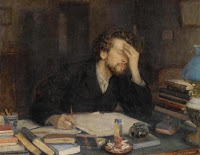 Writer Bobbie Bolig writes poignantly about what it's like to be blocked. I asked some pro writer friends for words of encouragement.
Writer Bobbie Bolig writes poignantly about what it's like to be blocked. I asked some pro writer friends for words of encouragement.This is from a well-known, NYTimes-best-selling author:
WRITER'S BLOCK
I am sitting here looking at a fic I have not touched since 2007. I have 135K done, including the last scene...or, about 2/3 of the total fic. I am ALSO sitting here looking at a novel that was due three years ago, for which I have something similar to an outline and the first 50K written (only 100K to go, right?)
I've been writing fanfic and profic since the 80s, and dealing with blocked, derailed, and MIA stories for most of that time. Here are some of the strategies that have worked for me. (NOTE: some of these ideas are mutually-exclusive, because every writer writes differently.)
1. WELCOME TO THE GULAG: Block out a specific time and place where you do the same thing every day: sit in front of the screen and make words come. Doesn't matter what you write, or even if you don't write. Just be there doing nothing else (no shopping, no reading AO3, no social media) for that one or two hours (no more) each and every day (same Bat-time, same Bat-channel). Eventually your brain gives up and you get to write what you want to write.
1A. If absolutely nothing else will come to your fingers, choose a favorite book (or longfic) and retype it.
2. FACE THE MUSIC: Between day job and commute (long) I was really bushed when Writing Time arrived in the evening. I just didn't have the energy—but I did have a deadline. Solution? ROCK'N'ROLL BAY-BEE!!! I wrote two novels to "Bad To The Bone". Just that one track. On infinite repeat. Loud. So pick a piece of music, declare it your writing music, and hit "Repeat" on iTunes.
2A: Earphones are a great help. Use the sport kind that leave your ears free.
3. WELCOME TO THE MACHINE: When I would dry up working on a piece—and we are talking YEARS in some cases—it was often because I was trying to take it in the wrong direction. I learned to recognize that feeling when it came and take a step back. (You can either wait for inspiration to come—I know! I know!—or try to negotiate with your subconscious. Or, yanno, try to REASON your way through to the answer.)
3A. Sometimes switching to another project will help.
4. PRESENT COMPANY: 95% of all fic is written in the present tense, for reasons that utterly escape me (even though I do it too). Try taking your blocked piece and changing it to past tense. Or first person. Anything to get The Muse—AKA your subconscious—awake and grumbling. (When you have annoyed it enough it usually gets back to work. Nobody knows how much annoying is the exact right amount, though.)
5. THE WALLPAPER IS ALSO A CHARACTER: Back in the beginning, when typewriters ruled the earth. I made a solemn vow not to stop for the night before I had two pages (500 words). And when nothing else would come, I described the background. Or the weather. Or the furniture. (Amazingly, all those descriptions didn't look out of place when the book was done.)
5A: The corollary to this is THE MAGIC TCHOTCHKE: Every story needs one important and well-described item. It might be a magic sword, a 1967 Chevy Impala hardtop, a big stone ring built by Ancient astronauts. Find out which it is in your story and show it some love. And if your story doesn't have a magic tchotchke yet, consider adding it.
6. INERTIA CREEPS (MOVING UP SLOWLY): If you know what comes next, tell yourself. Use any words you need to for writing down the information. Sometime this is called a scene-by-scene breakdown. It is very familiar to the "treatment" for a film (most good books on screenwriting will show examples of treatment style). Once you have a version of what happens, you can poke at it to see if it's the "real for true" version. Then you are one step closer to finishing the story.
7. EURIPEDES, YOUR PANTS ARE READY: There are essentially two kinds of writer: the Pantser, and the Outliner (I'm both. Sue me.) The Pantser begins a work with a vague idea of where it might be going and an enthusiasm for the journey, and not much more. The Outliner wants a roadmap, a GPS, and the location of every Rest Stop along the road before beginning. The takeaway here is that BOTH METHODS WORK WONDERFULLY WELL. Except if you're a Pantser who's trying to follow a detailed outline. Or an Outliner who's decided to just go with the whole Inspiration thing. Figure out which kind you are, and nurture that writing-self.
8. LOOSE LIPS SINK SHIPS (THE "I WILL GO DOWN WITH THIS SHIP" REMIX): Writing takes emotional energy. So does talking about your WIP. If you deny yourself the outlet of talking about your story while it's in progress, you might just find that (since you are looking forward to all those lovely comments) this gives you enough oomph to unlock your Muse.
And don't forget The Broccoli Test, The Bechdel Test, interviewing your characters, and the story's Blooper Reel. (I'm hoping somebody else will cover these in depth?)
Good Luck!
--- Dejah Vue, Writer of Two Worlds
If you'd like to contribute to the discussion, email me at mail@deborahjross dot com.

Published on February 15, 2019 01:00
February 13, 2019
Today's Moment of Art
Published on February 13, 2019 01:00
February 11, 2019
Lace and Blade 5 Author Interview: Julia H. West
 From lands distant or nearby, familiar or utterly strange, historical or imaginary, from ancient times to the Belle Époque comes a treasury of luscious, elegant, romantic fantasy. Come with us on a journey through time and across boundaries, inspired by the longings of the heart and the courage residing in even the meekest person.
From lands distant or nearby, familiar or utterly strange, historical or imaginary, from ancient times to the Belle Époque comes a treasury of luscious, elegant, romantic fantasy. Come with us on a journey through time and across boundaries, inspired by the longings of the heart and the courage residing in even the meekest person.The release date is Valentine's Day 2019, but you can pre-order it now:
Kindle: https://amzn.to/2PBzyj6
ePub: https://www.books2read.com/u/bwYJwP
I've known Julia H. West since the days of the GEnie science fiction community and have long wanted to edit a story of hers. "Water Bound" was originally submitted to a different anthology that I was co-editing, but Julia very graciously agreed to let me have it for Lace and Blade 5.
Deborah J. Ross: Tell us a little about yourself. How did you come to be a writer?
Julia H. West: I started writing stories influenced by my reading when I was in grade school (the only one I remember was “Martin the Mountain Lion” which was supposed to be rather Ernest Thompson Seton-esque). I started reading science fiction when I was about six years old, aided by my Dad, who read A Princess of Mars to me at bedtime.
By the time I was a teenager I had systematically read almost every science fiction and fantasy novel in the local library. I distinctly remember one day when I put down the novel I was reading and said, “I could write something better than this.” So when I was a senior in high school I wrote my first novel. I still have that manuscript--handwritten with pencil on lined notebook paper.
Back then there weren’t the plethora of writing resources available to young writers now, so I sat in the library and read the articles in The Writer’s Market and flipped through its pages looking for markets for science fiction and fantasy stories.
I wrote stories, submitted them to markets, and finally started selling stories. I always carry a notebook with me so I can jot down ideas, brainstorm, or write the next scene when I’m in a waiting room or somewhere else where I just have to sit.
DJR: What inspired your story in Lace and Blade 5?
JHW: I participate in a writing challenge called “Story a Day in May,” wherein one tries to brainstorm and write a story every day in May. (For the record, the most stories I’ve ever written in one May is fifteen, but I have, over the years, sold several of the stories
written during the challenge.) The prompt for “Water Bound” was ‘Your story is a romance between a caring mentor and a short person who kicks tremendous ass. The lovers experience isolation. One of them is motivated by already being damned.’ I brainstormed this idea for about half an hour, then started writing. The story strayed a fair amount from this original prompt, and got very long, but I liked it enough to keep writing.
DJR: What authors have most influenced your writing?
JHW: Andre Norton was my first and most beloved influence. When I was in high school I idolized her, and read every novel of hers the library had multiple times. I saved up and bought as many of her books as I could. Her way of blending fantasy and science fiction tropes fascinated me, and led quite directly to the way I tend to put a fair
amount of fantasy into my science fiction stories.
DJR: How does your writing process work?
JHW: I’m no good at brainstorming in my head. For years I have filled notebooks and computer files with brainstorming for the novels and stories I write. I do a lot of brainstorming on the computer, but I still write by hand in notebooks as well. I find I think differently when writing longhand and typing into the computer, so sometimes when I get stuck I’ll switch from one to the other.
I used to extensively outline every story or novel I worked on, but in the last few years I’ve learned to trust my storytelling sense a bit more. Now I come up with the high points, the places I want to assure I touch in the story, and just let my writing mind fill in the parts in between.
Once I have a story to the editing or rewriting stage, I often go over it with my oldest daughter. We are both critical about the connotations of particular words, and will sometimes discuss a single word or sentence for ten or fifteen minutes until it “tastes” right.
For years I have been a member of various writers’ critique groups. I like to have other eyes go over my manuscript and see things I missed. People’s different life experiences mean that everyone can bring a unique viewpoint to their critiques, and I value other viewpoints.
When I have gone over the critiques and I’m doing a final polish, I use Ken Rand’s Ten Per Cent Solution to excise passive voice, over-used words, and the like, making my story as evocative as possible.
DJR: What have you written recently? What lies ahead?
JHW: I’m working on a novel set in a fantasy version of Africa, with a highly improbable city with no water sources set in the middle of the desert. I also have a pseudo-Victorian trilogy on the back burner until I finish the other novel, and I’m doing final polish on a science fiction novel that will go out to publishers soon.
Because I “write long” I’ve been practicing writing flash fiction, trying to tell an entire story in around 1000 words. It has been an interesting experience, and I think I’ve learned a lot.
DJR: What advice would you give an aspiring writer?
JHW: Find your tribe. Writing is such a solitary activity that being able to connect with others who write, even if it’s just in a social way and not a critique group, is important to help you validate yourself and your writing.
Keep writing. Even if you’re stuck on your current project, just write about your day, your problems, or what you had for dinner. This helps me loosen up the “logjam” in my mind. Sometimes when I’m in the middle of complaining about my day I get an idea for the story I’m currently writing. Does this always work? No, but it’s certainly
good practice.
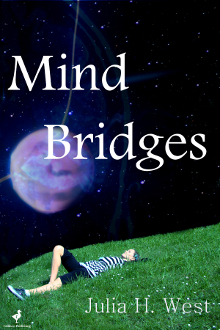 When Julia H. West was in college studying anthropology, people asked her, "What will you do with your degree?" She always replied, "Write science fiction and fantasy." She enjoys finding interesting cultural and mythical tidbits for her stories. In creating Vlazantzar she mixed the notion of djinn who live in water pipes with the idea of a demon who rests on uncovered water at night and blinds those who drink from it. The water-filled tunnels beneath Kindah are modeled on underground desert aqueducts called qanats first built in ancient Persia. [Deborah adds that qanat is a great word for Scrabble players.]
When Julia H. West was in college studying anthropology, people asked her, "What will you do with your degree?" She always replied, "Write science fiction and fantasy." She enjoys finding interesting cultural and mythical tidbits for her stories. In creating Vlazantzar she mixed the notion of djinn who live in water pipes with the idea of a demon who rests on uncovered water at night and blinds those who drink from it. The water-filled tunnels beneath Kindah are modeled on underground desert aqueducts called qanats first built in ancient Persia. [Deborah adds that qanat is a great word for Scrabble players.]Julia lives in West Jordan, Utah, with a husband and two daughters, who also write science fiction and fantasy. They share the house with numerous benevolent cat overlords who occasionally try to write stories, but the humans never understand or appreciate it when they find such gems as "4rtefffffffdd," "jweqqqqqa," or "zsxd]" in the middle of a manuscript left open on the computer. (By the way, if you speak Cat, perhaps you can translate those offerings, as they are actual bits copied and pasted from the Writings of Cats.)Julia's website is at http://juliahwest.com

Published on February 11, 2019 01:00
February 8, 2019
Writer's Round Table: Pros Give Advice on Writer's Block I
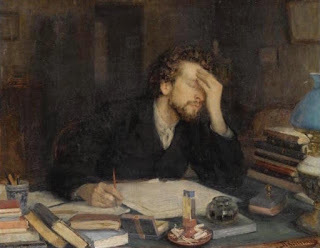 Not long ago, writer Bobbie Bolig told me about her anguish in being unable to write. I've been there, too, although for different reasons, and I'm grateful to those who encouraged me and were patient with me (even when what I finally managed to produce was melodramatic drek). Bobbie's predicament touched me deeply, so I asked professional writers if they could share their experiences and hope with her. Those essays will follow in subsequent weeks.
Not long ago, writer Bobbie Bolig told me about her anguish in being unable to write. I've been there, too, although for different reasons, and I'm grateful to those who encouraged me and were patient with me (even when what I finally managed to produce was melodramatic drek). Bobbie's predicament touched me deeply, so I asked professional writers if they could share their experiences and hope with her. Those essays will follow in subsequent weeks.To get started, though, here's Bobbie's story:
Writers' Block. The Gap That's Hard to Cross
By Bobbie Bolig
I stare at an empty page.The ideas are flying around in my head, I just can't get them onto a page.Suddenly there's a great chasm in front of me and I continue to just stare at the space where words should be. I'm in the gap of writing.I contemplate this very matter as I myself stare at a blank page I've been in a two year block myself.. How do you find the good with the bad of a writers' block? Some blocks can last only a short time, while others can last years. What's the good and bad to that?
Pros
· You get a chance to run ALL the scenes through your mind.· You can get other work done.· You can cook a healthy meal. · You can catch up on much needed sleep.Running through all the scenes in your head yet not able to get them down on a page: frustrating yet it can be productive. You can plot different paths you want your story to take. Take notes and write them down, even if it's just a sticky note.Face it your housework probably needs to be done. Concentrating on writing can take our minds off a lot of the outside world of our own brain. The dust might be piling up and now you can get rid of it. Also may help clear the dust and clutter out of your mind.Again, once we get into writing mode we tend to be in our own little world and just don't eat well. Eating well can give you brain power Go out to eat with friends. Give your poor overworked brain a break.Sleep! Sweet, sweet sleep. Unless you set yourself a set time limit on how long you write, we tend to write till we drop. Catch up on that sleep, you probably need it.
Cons
· You have all those wonderful stories that are just running through your head. · Too much time on your hands. Without writing you have to find something else to do.· You get frustrated easily. The blank page is your enemy. · Eating the wrong things.· Oversleep because of depression. Feeling sorry for your self.
Oh those stories... They're in there, You know keenly well just what stories are up there. Please write down notations on these stories. You might not be able to write then at the moment but you can try in the future and now you have notes to go by.You are now confused as to what to do with your time. Do you want to hang out with friends, do you want to go to the park. Hey take that puppy or kitty for a walk. They need your time.Frustration is the easiest emotion right now. You want to pull your hair out, scream, key-mash the keyboard. But right now you stare at the blank page. It's suddenly become your mortal enemy, the keyboard is an unwilling accomplice.Eating has also become an enemy. We tend to want comfort food, junk food, easy food. You need to take care of yourself by eating right. Eating right gives you brain food. Energy for your brain.You need sleep but sometimes, when facing a daunting task we go into a hibernation like mode. All we want to do is sleep. The bed is suddenly the most comfortable place we've ever been. Yes sleep is good, too much sleep can be harmful mentally.
The writers block/gap is not a fun place to be. It's depressing and void like, sucking the very writing soul out of you, Finally I've found that being prompted by outside sources can get the creative juices flowing. Look for prompts online. Something is sure to hit just that right story-line. I've been sitting here feeling sorry for myself and all it actually took was an invitation and prompt from a wise lady.This is the most I've written in over two years. It feels good to write something again.
Bobbie Bolig describes herself as “a 59 year old single mother of a disabled adult son. I live in the suburbs of Grand Rapids MI. I do mostly fanfiction writing and blogging. I enjoy writing, crocheting, beadwork, scrapbooking and origami.”
If you'd like to contribute to the discussion, email me at mail@deborahjross dot com.

Published on February 08, 2019 01:00
February 6, 2019
Today's Moment of Art

Valley of Aosta: Snowstorm, Avalanche, and Thunderstorm (1836/37),
Joseph Mallord William Turner (1775-1851)

Published on February 06, 2019 01:00
February 5, 2019
Kitten Detente
Our two girls are getting along famously.
The one-eyed dilute torbie (tortoiseshell tabby) is Freya.
The red and white (with golden eyes) possible Maine Coon mix is (Red) Sonja. She's 6 weeks older but had a really rough start in life, so is slower to catch up. They're both about 4 1/2 lbs now.
Interestingly, when they play neither is dominant.
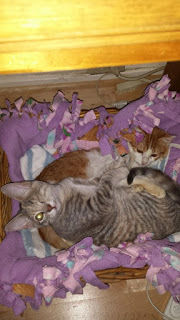
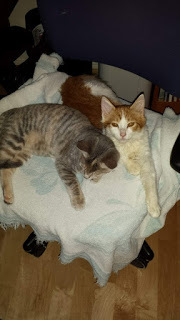

The one-eyed dilute torbie (tortoiseshell tabby) is Freya.
The red and white (with golden eyes) possible Maine Coon mix is (Red) Sonja. She's 6 weeks older but had a really rough start in life, so is slower to catch up. They're both about 4 1/2 lbs now.
Interestingly, when they play neither is dominant.



Published on February 05, 2019 10:40
February 4, 2019
Lace and Blade 5 Author Interview: Dave Smeds
 From lands distant or nearby, familiar or utterly strange, historical or imaginary, from ancient times to the Belle Époque comes a treasury of luscious, elegant, romantic fantasy. Come with us on a journey through time and across boundaries, inspired by the longings of the heart and the courage residing in even the meekest person.
From lands distant or nearby, familiar or utterly strange, historical or imaginary, from ancient times to the Belle Époque comes a treasury of luscious, elegant, romantic fantasy. Come with us on a journey through time and across boundaries, inspired by the longings of the heart and the courage residing in even the meekest person.The release date is Valentine's Day 2019, but you can pre-order it now:
Kindle: https://amzn.to/2PBzyj6
ePub: https://www.books2read.com/u/bwYJwP
I met Dave Smeds in the early years of my writing career through the pages of the early volumes of Sword and Sorceress, in which we each had stories. We discovered a shared background in martial arts, as well. His beautiful designs grace the covers of many of the anthologies I've edited, including this one.
Deborah J. Ross: Tell us a little about yourself. How did you come to be a writer?Dave Smeds: One way to put it is that it was an entirely natural thing. I did a lot of reading as a kid, and wanted to create my own stuff. The only thing as alluring as writing fiction was to be a comic book artist, but while I took some steps in that direction and still do make some of my income as an artist, I just wasn’t fast enough or good enough to realize that particular pipe dream. Your question, though, makes me aware of how generational my choice was. I was born in the mid-1950s. In my youth I didn’t have the distraction of iphones and cable channels and the World Wide Web. Heck, at first, there wasn’t even any color on the television programs I watched. My leisure entertainment came in the form of paperbacks, print magazines, and comic books. Those outlets were a big deal back then to the whole society in terms of providing sustaining creative entertainment and edification. I wanted to be part of that big deal. I wonder if I would have headed in that direction if I had been part of the millennial generation. I think the answer would probably be no.
DJR: What inspired your story in Lace and Blade 5?DS: The theme of the series is along the lines of “swashbuckling tales of romance” and of course I pointed my muse in that direction, but when it comes to the Lace and Blade series, my muse has pretty consistently been a contrary wench. I saw an image in my mind of the lone adventurer wandering the land. That seemed pretty spot-on in terms of theme, but when the fellow came completely into view I saw that he was the pilot of a gondola on a river, à la Charon on the River Styx if only Charon had possessed sex appeal and if only the river weren’t so singular of purpose. My plan of course was for the story to involve a romance. That element is in fact in there in the final draft, but to my surprise it is unconsummated, which is not one of my usual modes.
Once I had the idea of using a river as a setting, I’m afraid I had no choice but to go forward. The Kings River of the southern San Joaquin Valley runs along the edge of the farm where I grew up. I spent many an hour on that waterway, floating on tractor inner tubes below the bluffs and oak trees. The water was snow melt from the High Sierra so it was bracing even in July, but that was great because the air temperature of a Fresno County day in July is usually above a hundred degrees Fahrenheit. I also really appreciated the safety aspect. If you get a tired of swimming when you’re in the middle of a lake, you’re screwed. If you get tired on a river, just tread water for a few moments and the current will carry you to the bank and you don’t have to drown after all.
DJR: What authors have most influenced your writing?DS: In the early days, I never thought of myself as deeply influenced by any particular author, except perhaps in the sense that I loved to write heroic fantasy, and back then, anyone doing that was standing on the shoulders of Robert E. Howard and J.R.R. Tolkien. In retrospect, I see L. Frank Baum's influence upon the way I structure a story. Joseph Campbell speaks of heroic fantasy as the so-called hero’s journey, as if all examples are like that, which is to say, they are tales in which a protagonist, usually a young man, pulls himself up by his bootstraps, stands alone, and takes full credit for completion of a goal. But Baum did not write that way. He wrote what is better described as the heroine’s journey, in which his protagonist, be it Dorothy Gale or one of the many others, does not fight battles, but instead makes alliances. That’s a more subtle, complex, and dare I say, meaningful process. I see plenty of works out there that adhere to the Campbellian mode. Many are about a female protagonist and many are written by female authors, but they’re still the hero’s journey. That’s fine, but I on the other hand will go on doing what Frank showed me.
DJR: What’s the most memorable fan mail you’ve ever received?DS: A letter from a man who had served as an officer in Vietnam, thanking me for writing “Short Timer.”
DJR: How does your writing process work?DS: My process would drive any other writer nuts, I suspect. The ideas -- whether it is for a scene, a character, a setting, a plot, a premise -- bubble up and I go with what fascinates me at the moment. I see the whole story as a piece and fill in the pieces almost randomly as if assembling a jigsaw puzzle. I might write the ending first. I might write a little bit that fits two-thirds of the way along. Often I will start at the beginning, but it's just about unheard of that I proceed from page one to the end in chronological order. I think that's happened only three or four times in forty-eight years of writing, and only with very short pieces.
DJR: What have you written recently? What lies ahead?DS: Just shy of thirty-two years after I began it, I have finally completed a full draft of The Wizard’s Nemesis, which completes the trilogy that began withThe Sorcery Within. As I jot down the answers to this set of interview questions, the editing and proofing and production phase of the novel -- and of the new editions of the first two books -- is still to come, but publication is now officially “pending.”
DJR: What advice would you give an aspiring writer?DS: Forget about it. Quit right now. I don’t need any more competition.
DJR: Any thoughts on the Lace and Blade series or this being its final volume?DS: I’m particularly discouraged to learn this is it, at least for now. It had barely started up again. I did four pieces for the series, skipping only volume two. For whatever reason, be it the theme or serendipity or faith or just the workings of that contrary-wench muse, I feel as though those four pieces are among the ten best stories of my career, and I was looking forward to having the chance to aim at that standard again.
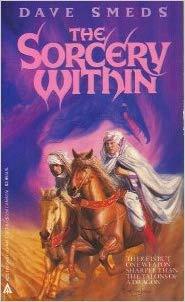 Dave Smeds has authored novels (including The Sorcery Within and X-Men: Law of the Jungle), screenplays, comic book scripts, and articles, but is best known for his short fiction. His work has graced the pages of Asimov's SF, F&SF, Realms of Fantasy, and a plethora of anthologies, including most particularly the Sword and Sorceress series and the Lace and Blade series.
Dave Smeds has authored novels (including The Sorcery Within and X-Men: Law of the Jungle), screenplays, comic book scripts, and articles, but is best known for his short fiction. His work has graced the pages of Asimov's SF, F&SF, Realms of Fantasy, and a plethora of anthologies, including most particularly the Sword and Sorceress series and the Lace and Blade series.
Published on February 04, 2019 01:00







